|
What’s new in OA & scholarly publishing in Australia & Aotearoa New Zealand
What’s new in OA & scholarly publishing globally
Recent writing & resources on OA
Upcoming events in OA & scholarly publishing
With just over a month before Open Access Week 2023 we are very happy to be bringing you some dynamic and thought provoking presentations across four days from 24-27 October. Our website & events calendar is now open for registrations (see session details below).
Contributions to the newsletter or the blog, especially notice of upcoming events, are welcome. Contact us here. If this newsletter was forwarded to you and you’d like to receive it directly, please sign up.
What’s new in OA & scholarly publishing in Australia & Aotearoa New Zealand
Trust in science critical
Australia’s Chief Scientist Dr Cathy Foley says she’s concerned about debates in science which som etimes wrongly question the integrity of the science. She’s released the paper Trust in Science to outline the elements of quality science and the systems that underpin & support quality in research in Australia. As she notes “Questioning is healthy for good science and good government, but distrust is not.”
etimes wrongly question the integrity of the science. She’s released the paper Trust in Science to outline the elements of quality science and the systems that underpin & support quality in research in Australia. As she notes “Questioning is healthy for good science and good government, but distrust is not.”
New governance model for Māori Data
A report has been released by Aotearoa New Zealand iwi-led organisation made up of iwi-Māori data experts, Te Kāhui Raraunga to guide the governance of Māori Data for use across the public service. The report details how the Māori Data Governance Model works, what it aims to achieve and why it is necessary.
ARDC: National Persistent Identifier Strategy launch
Australian Research Data Commons is running a webinar next week introducing a draft National Persistent Identifier (PID) Strategy. More than 80 people from research institutes, universities, funders, government departments and research infrastructure providers had had input into the strategy. PIDs such as DOIs provide machine-readable connections between research outputs and underpin tools like the Unpaywall browser extension. Register for the webinar here.
Draft principles developed at #digitalnationbuilding
Croakey Health Media has released draft principles from an open network of people advocating for safer digital infrastructure and news and information systems. The event was held to look at a future digital space that centres on the public interest rather than commercial imperatives, and looked at whether governments should step up to fund and lead the development of a not-for-profit public space that could provide the information, news and connections formerly provided by Twitter. Read More.
New open research statement for Waikato
The University of Waikato’s Research Committee has approved an Open Research Position Statement. The university has also released a report Exploring researchers’ views on Metrics and research impact: Internal report. Download or read report here.
Planning for Social Science infrastructure
We’ve made a submission to the Academy of Social Science of Australia concerning the Decadal Plan for Social Science Research Infrastructure 2023-32. Read it here.
Data Commissioner encouraged by new platform uptake
As of end July 2023 the Office of the National Data Commissioner has on-boarded more than 50 organisations to Dataplace, the new digital platform that will make it easier to request Australian Government data.
WikiCon coming to Brisbane
Anyone interested in open knowledge and meeting fellow Wikimedians are invited to join Wikimedia Australia for an exciting conference program covering all things Wiki. The free event in November will deliver the latest developments, tools and projects Wiki’s Australian community is undertaking on Wikipedia, Wikidata, WikiCommons, WikiSource and other Wiki platforms. More information & registration.
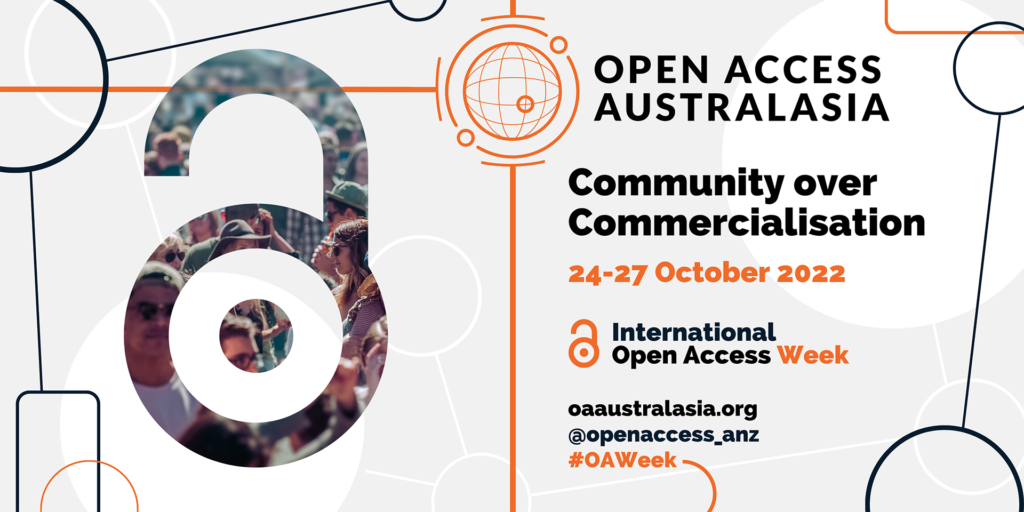
Community over commercialisation: What is community control and why does it matter?
24 October – 9-11am AWST, 11am-1pm AEST, 12- 2pm AEDT, 2-4pm NZDT
Different communities have different needs, aims and priorities about the knowledge they hold and create. There can be a tension between open access and community control of that knowledge. How do communities keep control of their knowledge while opening it to the world? How can open access be used to help build and strengthen communities? This session looks at the ways communities openly share their knowledge. It also explores how sometimes community and commercial interests can coexist. REGISTER HERE
Like an open book: can academic communities ensure our voices are heard by all?
25 October – 9-11am AWST, 11am-1pm AEST, 12- 2pm AEDT, 2-4pm NZDT
Books are where we record our knowledge, for us and for others. However, books remain far less open than journal articles. Why is this? What opportunities are there for academic communities to improve access to our knowledge and culture? How can uniquely Australasian voices be heard? In this session, we will hear from panellists working in different ways to improve access to books. In the second hour, participants will be given the chance to reflect on the discussion and share their thoughts. REGISTER HERE
Shine on Diamond journals: making sure they’re forever
26 October – 9-11.30am AWST, 11am-1.30pm AEST, 12- 2.30pm AEDT, 2-4.30pm NZDT
Diamond open access journals are an important but undervalued part of the open access journal publishing system. They often lack infrastructure, funding and coordination. This workshop, which is being run as a satellite meeting as part of the Global Summit on Diamond Open Access being held in Mexico this week, will hear from those already involved in successful diamond OA initiatives, workshop what is needed for successful diamond OA journals, and develop a plan for necessary next steps in this region. REGISTER HERE
Creating space for Indigenous and Pacific research
27 October – 9-11am AWST, 11am-1pm AEST, 12- 2pm AEDT, 2-4pm NZDT
Part 1: Publishing avenues for Indigenous-led research
How do Indigenous academics share their research in a way that is meaningful to them and the communities they wish to serve? A number of Indigenous-led open access journals have been set up with the purpose of exploring Indigenous and Pacific issues and concerns, providing an opportunity to disseminate research. This session will explore the driving force behind the development of these journals, and the challenges in getting Indigenous research out into the scholarly community.
Part 2: Engagement with indigenous knowledge
How do Indigenous communities share their knowledge in a way that aligns with their community rules and protocols? How can we ensure Indigenous knowledge is treated respectfully when it is in the public domain? This session will explore some of the recent initiatives seeking to tackle these questions.
What’s new in OA & scholarly publishing globally
G20 Chief Science Advisors meeting
The G20 Chief Science Advisors Round Table met in India last month. One of the commitments made was to synergise global efforts to expand access to scholarly scientific knowledge. recommending “establishing interoperability standards that would allow interlinking among various national as well as international repositories to expand access to publicly funded research outputs.” The Council of Open Access Repositories (COAR) is hoping to advise on this recommendation. Read the meeting outcome document and Chair’s summary.
Crossref acquires Retraction Watch data
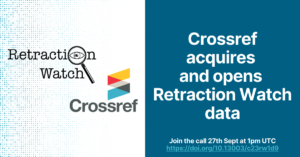 The Retraction Watch database has been acquired by Crossref. An agreement between the two not-for-profits will allow Retraction Watch to keep the data populated on an ongoing basis and always open, alongside publishers registering their retraction notices directly with Crossref. The data is CC0 (public domain dedication) and Crossref has committed to providing attribution to Retraction Watch when it uses the data. Read more.
The Retraction Watch database has been acquired by Crossref. An agreement between the two not-for-profits will allow Retraction Watch to keep the data populated on an ongoing basis and always open, alongside publishers registering their retraction notices directly with Crossref. The data is CC0 (public domain dedication) and Crossref has committed to providing attribution to Retraction Watch when it uses the data. Read more.
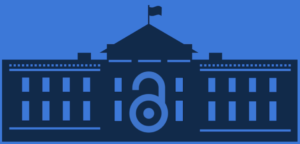
Image originally published on Fully OA blogpost 7/8/23 used under CC-BY 4.0 licence
USA OA supporters fighting block to OSTP guidelines
The Fully OA group of publishers in the US has responded to the House Appropriations Committee’s spending bill that blocks implementation of Office of Science & Technology’s much welcomed policy guidance to make federally funded research freely available without embargoes. The bill also retains the 12-month embargo, thus removing the current requirement for commercial publisher to adapt their existing models. Read more. Other groups are also opposing the bill, including ASAPbio.
High APCs & $$$ force more editorial team walkouts
Most of the editorial team at Wiley’s Journal of Biogeography has resigned over concerns about the journal’s high article processing charges. It follows last month’s removal of an editor at Elsevier’s long running Design Studies journal over pressure to increase the number of articles published (and APCs paid) from 35 to 250. Inside Higher Ed reports many on the board are threatening to quit, one saying the change appears to be motivated purely by profits. It follow’s the mass editorial resignation at Elsevier journal NeuroImage earlier this year over high APCs. Read more
Finnish consortium warns sub costs “unsustainable”
The FinELib consortium which has negotiated read & publish agreement on behalf of Finnish universities and research institutions said the increasingly high fees are unsustainable, and “the situation won’t change unless we are genuinely ready to reject unreasonable contract proposals and critically reflect on our publication practices.” It said it is prepared to discontinue some journal agreements if necessary. Read more.
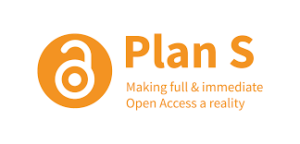
Reflections on 5 years of Plan S
Executive Director of cOAlition S, Johan Rooryck has published his reflections on the last five years, and given some hints on the plan’s future direction. Read his blog here. There will be a “Plan S at 5” anniversary webinar in November. Register here.
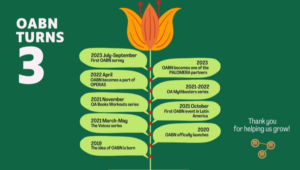 Happy birthday to the Open Access Books Network
Happy birthday to the Open Access Books Network
Packing a big punch from small beginnings, it’s great to see advocacy organisations like OABN reach these milestones. See their OA Mythbusters video series & OA Books Toolkit and other resources for publishers, libraries, authors and funders.
Towards 100% OA in Ireland
OpenAIRE has been awarded the contract to develop Ireland’s National Open Access Monitor, based on public open data, to analyse and track progress towards 100% Open Access in Ireland. Read more
Resources
Primers on Working in Open Research
The UK Reproducibility Network has created a suite of introductory guides for people working or considering working in open research. They’ve been drafted by members of the Open Research Competencies Coalition.
Working in Research Data Management
What we’re reading
Is the Tide Turing in Favour of Universal and Equitable Open Access? By Moumita Koley – International Science Council blog
Open Access and University IP Policies in the United States By Martin Adams – Authors Alliance blog
Open Access to University Press Frontlists: A Call to Action By Curtis Brundy, Laura Hanscom Barbara Kern, Brigitte Weinsteiger – The Scholarly Kitchen
Print Revenue and Open Access Monographs: A University Press Study By Laura Brown, Maya Dayan, Brenna McLaughlin, Roger C. Schonfeld, John Sherer, Erich van Rijn on Ithaka S&R
Upcoming events in OA & scholarly publishing
![]()
WikiCon 18 November Brisbane Australia
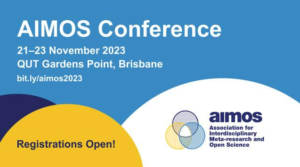
Association for Interdisciplinary Meta-research and Open Science
21-23 November Brisbane Australia

Global Summit on Diamond Open Access
23-27 October Toluca Mexico
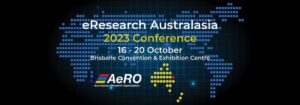
16-20 October eResearch Australia Conference
Copyright (C) 2023 Open Access Australasia. All rights reserved.
You are receiving this because you signed up to the Open Access Australasia (previously AOASG) mailing list
Published under a CCBY 4.0 licence
Our mailing address is:
Open Access Australasia
Library UNSW Sydney
Sydney, NSW2052
Australia
Want to change how you receive these emails?
You can update your preferences or unsubscribe